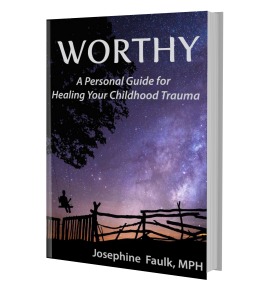Vulnerability Can Heal Your Inner Child
Is it any wonder that our attempts to communicate with our partner often crumble into uber-emotional blamefests? We blindside them then are crushed when they don’t magically make it all better for us. Afterward we survey the damage we’ve done and one of two things usually occur, 1) We have an overwhelming urge to run out of the house like our hair’s on fire, or 2) We retreat to our inner fortress with our guts in a wrenching twist, more baffled than we were before the incident we incited occurred. Neither of which result in us feeling loved, cherished and understood. Once again, we vow never to reveal our true feelings.

Here’s a wee glimpse of what I’ve learned about honesty in a romantic relationship throughout my recovery:
- Honestly expressing your feelings, needs and desires is an indication that you love and honor yourself.
- Honestly expressing your feelings, needs and desires is an indication that you trust in the love and goodness of your partner.
- Honestly expressing your feelings, needs and desires will rather quickly indicate if the partner you are with is vested in your relationship . . . or not. Which, consequently, requires you to be brutally honest with yourself about moving on to a more fulfilling relationship or to more time by yourself to learn, grow and pursue the desires of your heart.
- Honestly expressing your feelings, needs and desires will often still be scary. But once you realize the cost of suppressing them, not expressing them is even scarier.
- I have learned if you focus on saying ‘what I need is . . .’ vs. ‘what I’m not getting is -blah-blah-blah’ it is much easier for your partner to listen to you.
- Backpeddling (taking back what you originally said you felt or needed, or making it less significant in some way) is a sign that you are either not clear about what you want or you are not honoring yourself and, hence, not honoring and protecting your inner child. It is a message that your needs are not really all that important overall. Which is not being honest!
- Honestly is not a license to be rude, unkind or mean.
- Honesty is best prefaced with appreciation, expressed gently and politely and concluded with love and a sincere compliment. It’s the ‘spoonful of sugar’ technique!
“Honesty is more than not lying. It is truth telling, truth speaking, truth living, and truth loving.” James E. Faust
Wishing you wholeness, serenity, love and fun!
Available at Amazon > Worthy: A Personal Guide for Healing Your Childhood Trauma
Before you go, I want to invite you to join our Worthy Community. By signing up (the form is in the sidebar) you will receive:
* Chapter One of my book WORTHY A Personal Guide for Healing Your Childhood Trauma immediately
* Personal delivery of my entire Monday blog post weekly
****************************
You can find and subscribe to me spreading the love at:
https://www.instagram.com/worthyasweare/
https://www.facebook.com/healingyourchildhoodtrauma/
https://www.pinterest.com/azsunnygrl/worthy-as-we-are/
Copyright ©2018 Josephine Faulk, MPH. Excerpt from WORTHY: A Personal Guide For Healing Your Childhood Trauma by Josephine Faulk,MPH.




